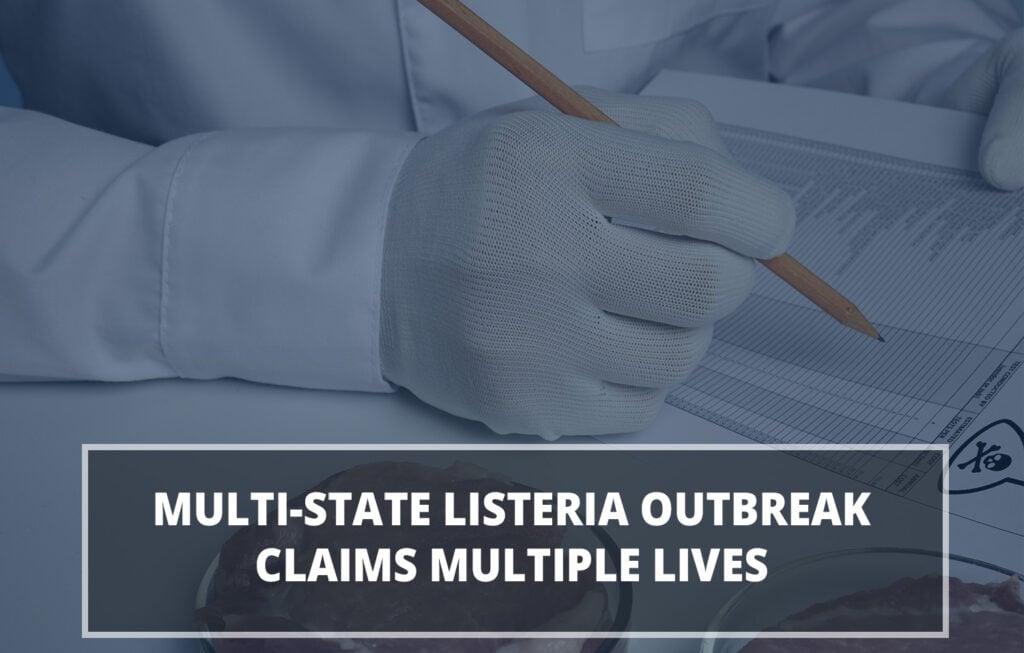Victims of the latest recorded listeria outbreak, which began in California and spread across the country, must act quickly to preserve their legal rights.
New evidence links products made by California-based Rizo-López Foods to the outbreak first detected in June of 2014. At least twenty-six people in eleven states have been stricken in the outbreak. One person died in California in 2017, and another fatality occurred in Texas in 2020, officials stated. The government investigated the outbreak in 2017 and 2021 but did not have enough information to identify a specific brand.
The recalled yogurt, cheese, and sour cream products were sold at more than 600 Walmart stores in twelve states: Alabama, California, Georgia, Hawaii, Iowa, Michigan, Minnesota, North Dakota, Nevada, Oregon, Tennessee and Wisconsin.
Listeria and Listeriosis
Invasive listeriosis has about a 25 percent fatality rate. As late as the 1990s, researchers knew little about this bacterium or the disease it causes. Now, that knowledge has expanded. Listeria, which is usually found in soil, often works its way into uncooked meat, fruit, and vegetables, pasteurized or unpasteurized milk, foods made from milk, and processed foods.
In other words, listeria could contaminate almost any food. Prior outbreaks have been linked to hospital sandwiches, smoked salmon, chicken wraps, and caramel apples.
Unsanitary production and storage methods usually cause listeriosis. Non-invasive listeriosis, a milder form of this disease, is localized in the digestive tract. The symptoms normally aren’t serious, unless the victim is pregnant (pregnancy compromises the immune system, especially in the third trimester) or has a pre-existing health condition.
Invasive listeriosis is a different story. If the infection spreads, most victims must spend at least two weeks in the hospital, where they receive high doses of powerful antibiotics.
The average hospital stay in New York is over $3,500 per day. At that rate, the costs add up quickly. Making matters worse, most group health insurance plans exclude injury-related costs.
This treatment also has long term consequences. People quickly become immune to antibiotics. So, if they contract invasive listeriosis and survive it, doctors may be unable to treat a subsequent bacterial infection, meaning that even a mild infection could be fatal.
FDA Actions
As outlined below, a lawyer can hold companies strictly liable for the damages their defective products cause. In sharp contrast, FDA officials cannot act unless they conclusively link a specific food to an outbreak. Furthermore, if this agency acts, it cannot do much.
To initiate a Class I recall, investigators must determine that “there is a reasonable probability that the use of or exposure to a violative product will cause serious adverse health consequences or death.” That’s an extremely high burden of proof that, in this instance, the FDA failed to meet at least once.
Additionally, before the FDA issues a recall, it must give the manufacturer a chance to voluntarily recall the defective or tainted product. If the company refuses to do so, the FDA cannot unilaterally recall the dangerous product. The agency can only publicize the risk and recommend a recall.
Over the years, lawmakers have introduced bills giving the FDA unilateral recall power, most recently the 2020 Recall Unsafe Drugs Act. That bill died in committee.
Legal Actions
Usually, the statute of limitations in a personal injury case is two years. So, victims who got sick six or eight years ago may not have a claim.
The discovery rule is basically a snooze bar on the statute of limitations alarm clock. This doctrine “tolls” the statute of limitations until:
- Victims know the full extent of their losses, and
- They connect those losses with a tortfeasor’s (wrongful actor’s) conduct or misconduct.
Some states have a statute of repose that completely cuts off defective product claims after a certain number of years, usually six or eight. A back door may be available, but there’s no guarantee.
Most listeria poisoning victims file failure to warn claims or defective product claims.
Manufacturers have a duty to warn people about known product defects or side-effects. So, the failure to warn, as opposed to the victim’s injury, is the primary focus of such a claim. Defective product claims usually focus on the victim’s injury. Listeriosis usually involves a manufacturing defect. One worker with unwashed hands or one non-working refrigerator could contaminate an entire lot of food.
Bacterial infections cause serious and costly injuries. Contact us for a free legal consultation, you have a limited amount of time to act.
